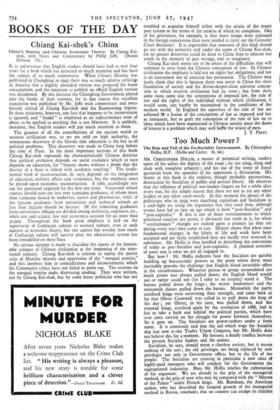BOOKS OF THE DAY
Chiang Kai-shek's China
IT is unfortunate that English readers should have had to wait four years for a book which has attracted so much attention and has been the subject of so much controversy. When China's Destiny was published in Chungking in 1943 there was so much adverse criticism in America that a slightly amended version was prepared for home consumption, and the intention to publish an official English version was abandoned. By this decision the Chungking Government played into the hands of their enemies, for in due course this excellent translation was published by Mr. Jaffe with commentary and notes bitterly critical of Chiang Kai-shek and the Kuomintang regime. In these criticisms, however, any fact that happens to be inconvenient is ignored, and " feudal " is employed as an indiscriminate term of abuse to be applied to anything that is not Marxism. It is unlikely, therefore, that English readers will pay much attention to them.
The greatest of all the contributions of the ancient world to western civilisation was, so we are told on high authority, the momentous discovery of the Greeks that education is the key to all political problems. This discovery was made in China long before the time of Plato. In the most important sections of this book Chiang Kai-shek expounds the characteristically Chinese doctrine that political evolution depends on social evolution which in turn depends on education, for "history shows without a doubt that the destiny of a State is linked with academic teaching." The funda- mental work of reconstruction, he says, depends on the integration of education, military affairs and economics, but the emphasis must be placed upon economic reconstruction. A table accordingly sets out the personnel required for the first ten years. Vocational school courses should turn out just over 2,000,000 graduates, of whom more than t,000,000 should be midwives, nurses and pharmacists, whilc of the 550,200 graduates from universities and technical schools no less than 232,coo should be doctors. Of the remaining graduates from universities 286,3oo are divided among architects, engineers, etc., while arts and science, law and economics account for no more than 31,000. Throughout the book great emphasis is laid on the superiority of Confucian culture to western culture, even in such matters as economic theory, but one cannot but wonder how much of Confucian culture will survive after the educational system has been remodelled on these lines.
No serious attempt is made to elucidate the causes of the lament- able -collapse of Chinese civilisation at the beginning of the nine- teenth century. Chiang Kai-shek is content to repeat the parrot cries of Manchu misrule and oppression of the "unequal treaties," and this involves him in contradictions and inconsistencies which his Communist critics have not failed to point out. The sections on the unequal treaties make distressing reading. They were written, not by Chiang Kai-shek, but by some lesser politician who has not troubled to acquaint himself either with the origin of the treaty port system or the terms of the treaties of which he complains. One of his grievances, for example, is that more troops were stationed in the foreign concessions than were needed to carry out the Consular Court decisions! It is regrettable that nonsense of this kind should go out with the authority and under the name of Chiang Kai-shek, for no greater disservice could be done to China than to educate her youth in the memory of past wrongs, real or imaginary. Chiang Kai-shek seems not to be aware of the difficulties that will continue to arise from the Chinese conception of law. In Chinese civilisation the emphasis is laid not on rights but obligations, and law is an instrument not of coercion but persuasion. The Chinese may justly claim that this is because there was never in China the slave foundation of society and the divine-despot-slave universe concep- tion in which western civilisation had its roots' but from these same roots came also the conceptions of imposed law, the rule of law and the rights of the individual without which civilisation, it would seem, can hardly be maintained in the conditions of the modern world. In England the asperities of the rule of law are softened by a fusion of the conceptions of law as imposed and law as immanent, but to graft the conception of the rule of law on to ideas which have been maintained in Chinese society since the dawn of history is a problem which may well baffle the wisest of men.
J. T. PRATT.


































 Previous page
Previous page